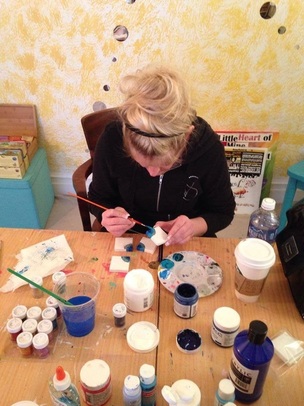Art Therapy & Counseling Sessions
Art Therapy and counseling sessions are held at our beautiful and relaxing studio, located in the heart of downtown Aurora at 52 W. Downer Place, Suite 204. We accept fee for service, Blue Cross-Blue Shield Illinois PPO, Aetna and Cigna.
Sessions are offered for children, adolescents and adults and are typically 45-60 minutes in length. Day and evening hours are available by appointment. You do not need to be a trained 'artist' to benefit from art therapy.
To schedule an appointment, call Melissa at 630-486-4078 or email her at [email protected].
All clinicians at TLOTH are trained as art therapists and counselors and use both modalities in treatment to best meet your needs.
Sessions are offered for children, adolescents and adults and are typically 45-60 minutes in length. Day and evening hours are available by appointment. You do not need to be a trained 'artist' to benefit from art therapy.
To schedule an appointment, call Melissa at 630-486-4078 or email her at [email protected].
All clinicians at TLOTH are trained as art therapists and counselors and use both modalities in treatment to best meet your needs.
Please print and complete the relevant forms and bring with you to your first session
|
|
|
| ||||||||||||||||||||||||
Art therapy is a mental health
profession in which clients, facilitated by the art therapist, use art media,
the creative process, and the resulting artwork to explore their feelings,
reconcile emotional conflicts, foster self-awareness, manage behavior and
addictions, develop social skills, improve reality orientation, reduce anxiety,
and increase self-esteem. A goal in art therapy is to improve or restore a
client’s functioning and his or her sense of personal well-being. Art therapy
practice requires knowledge of visual art (drawing, painting, sculpture, and
other art forms) and the creative process, as well as of human development,
psychological, and counseling theories and techniques (American Art Therapy
Association, 2013).
Professional counseling is a collaborative effort between the counselor and client. Professional counselors help clients identify goals and potential solutions to problems which cause emotional turmoil; seek to improve communication and coping skills; strengthen self-esteem; and promote behavior change and optimal mental health (American Counseling Association, 2015).
Professional counseling is a collaborative effort between the counselor and client. Professional counselors help clients identify goals and potential solutions to problems which cause emotional turmoil; seek to improve communication and coping skills; strengthen self-esteem; and promote behavior change and optimal mental health (American Counseling Association, 2015).

